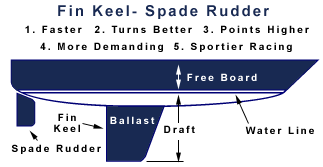Dry Dock – Part 3
The rudder is part of the boat that actually directs the water flowing past it in such a way as to turn the sailboat. Water has to be flowing past the rudder in order for the rudder to do what it is designed to do. This concept is difficult for beginning boaters to comprehend. I have witnessed many beginning boaters trying to turn their boat while their boat is at an almost standstill.
Losing a rudder while underway is VERY VERY BAD! A very skilled sailor can steer the boat by balancing the sails in particular ways. The “average” sailor would have a difficult time maneuvering a boat with just the sails.
If Jesus is the “keel” of the good ship PCUSA then the Bible and the PCUSA constitution make up the keel. To be “Presbyterian” we need both the Bible and the constitution. The Bible is God’s Word to Christians and the church and the constitution reinforces scripture and spells out how we are to be governed as a denomination.
The PCUSA has rudder problems when we move away from scripture. Our denomination has a rich history of being biblically based and honoring scripture. No two Christians are going to agree on how to interpret every little verse of scripture. However, we need to have agreement on those things that define the Christian faith. Unfortunately, the PCUSA has cast its net so wide that there are many (especially pastors, specialized clergy and denominational staff) who do not hold the beliefs of biblical, orthodox Christianity.
The PCUSA has rudder problems when major changes happen in the constitution. A major change can happen when a single word in the constitution changes (such as changing “shall” to “should”). The PCUSA is always one General Assembly vote away from rudder problems! The flaw in our “constitutional rudder” is that it is too easy to change the constitution. I believe that much of the tension in the denomination can be eliminated by requiring a 60% yes vote by a General Assembly to change the Book of Order and 60% of the presbyteries ratifying that vote. We need to make it VERY difficult to change the constitution. By doing this, we will force the General Assembly to do more than work on amendments to the constitution. The General Assembly meeting could be so much more than it is.
The PCUSA has rudder problems. The problems can be fixed! Ignoring those problems will cause rudder failure—that would most like be catastrophic!

